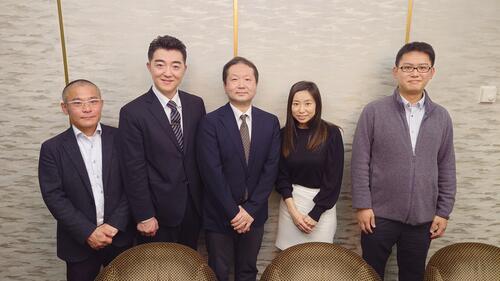SPICE Offers Course in Collaboration with Waseda University’s School of Social Sciences
SPICE Offers Course in Collaboration with Waseda University’s School of Social Sciences
Reflections on an intensive course on sustainable business and social innovation.

In early March, as the cold winter was coming to a close and people were patiently waiting for the first signs of cherry blossoms, I made my first visit to Waseda University, my father’s alma mater. I had the opportunity to organize and facilitate the inaugural SPICE/Stanford–School of Social Sciences/Waseda Intensive Course on Sustainable Business and Social Innovation, which was developed in collaboration with the School of Social Sciences at Waseda University. The one-week intensive course focused on fostering awareness of social issues, developing knowledge and understanding of diverse perspectives, and cultivating critical thinking and innovative thinking skills that help to promote social changes.
Despite Japanese universities being on spring break at the time, 12 dedicated students from the School of Social Sciences participated in the course with unwavering enthusiasm. I was excited to see a very diverse group of students from different backgrounds in a Waseda classroom. It was an ideal environment for students to be exposed to different viewpoints and develop new and innovative ideas.
Throughout the course, students were able to learn and engage in discussions with practicing social entrepreneurs and social investors who shared their stories, wisdom, and challenges. Ms. Moe Kaneko, who started her company to support caregivers in Japan, emphasized the serious issue of “young carers,” who care for older family members, and shared her own experience of caring for her father at home for over 11 years. Her lecture emphasized the necessity of making resources accessible to those in need, and the positive change that can result from educating people and the community about social issues. Mr. Glen Fukushima shared highlights of his life and extensive career, and underscored the importance of interdisciplinary approaches to business and social issues. He gave inspiring advice to the students to “challenge the status quo and try things people say cannot be done.” Ms. Eriko Suzuki’s lecture on Environmental, Social, and Governance (ESG) investing and impact investing was eye-opening to many students. Despite some challenges, she believed that ESG investing presents a bright outlook for the investment field. Ms. Suzuki closed her lecture with an important reminder to integrate “work and life with a sense of purpose.” Ms. Satoko Kono shared her experience with empowering people in developing countries through social investment, business matching, and knowledge and experience sharing. She emphasized that impact investments require patience, as they are usually made with a long-term perspective. Her story and her life journey towards creating social impact were truly inspiring.
These valuable stories from the guest speakers with real-world examples and case studies allowed students to see the impact of sustainable business practices and social issues in action. In addition, the guest speakers and I encouraged and reminded students throughout the course to ask questions that foster critical thinking skills and develop a deep understanding of complex issues related to social responsibility.
The class was also treated to a design thinking workshop by Dr. Mariko Yang-Yoshihara and Ms. Risako Ninomiya from SKY Labo who joined from Silicon Valley via Zoom. During the workshop, students worked in pairs to experience the five core stages of the human-centered design process: Empathize, Capture Needs, Brainstorm Solutions, Prototype, and Seek Feedback (Reference: “Introduction to Design Thinking,” SKY Labo) by creating a prototype, with recycled materials, for their partners based on their needs and challenges. This hands-on workshop was not only informative but also beneficial for students with their final project—through which they were tasked with developing an innovative idea to address a social issue.
For the final presentations, three groups presented their research findings on social issues and their solutions. The range of topics addressed included sustainability education with an emphasis on food waste, a platform for a sustainable clothing shop, and the issue of solitary death or kodokushi in Japan. Each group received questions and feedback from their peers and two commentators, Ms. Mai Iida and Mr. Yusuke Matsuda. I was highly impressed with the quality of research and presentations delivered by the students despite the very short timeframe they were given.
Through this course, I was reminded that collaborating with others to reflect on social issues and generate solutions is far more effective than working alone. Therefore, raising awareness about various issues and engaging more people in their resolution is crucial. I consider myself fortunate to have shared this experience with an exceptional group of students at Waseda University. I look forward to continuing our partnership with Waseda’s School of Social Sciences.

In closing, I would like to thank Dr. Gary Mukai for providing me this wonderful opportunity and my colleagues at SPICE for their support and encouragement through the process. Special thanks to Ms. Irene Bryant for her advice and guidance in curriculum development.
I wish to express my appreciation to Mr. Glen Fukushima, Ms. Mai Iida, Ms. Moe Kaneko, Ms. Satoko Kono, Mr. Yusuke Matsuda, and Ms. Eriko Suzuki, who took the time out of their busy schedule to guest speak at Waseda University. I also wish to thank Dr. Mariko Yang-Yoshihara and Ms. Risako Ninomiya for giving a wonderful, hands-on workshop on design thinking to our students. My special thanks go to Mr. Naoya Sugie for connecting me with wonderful speakers.
Finally, I would like to express my heartfelt gratitude to my collaborators at the School of Social Sciences at Waseda University for their amazing support and partnership. They are Dean Osamu Soda, Professor Yoshihiro Kitamura, Mr. Tomoaki Wakamatsu, Mr. Shuhei Yamamoto, and Dr. Hirokuni Yamada. Last but not least, I’d like to congratulate the students who successfully completed the SPICE/Stanford–School of Social Sciences/Waseda intensive course.
To stay informed of SPICE news, join our email list and follow us on Facebook, Twitter, and Instagram.
